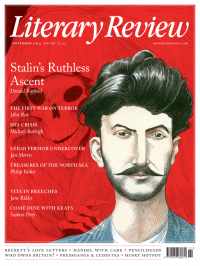Peyton Skipwith
Lines of Beauty
George Frederick Bodley and the Later Gothic Revival in Britain and America
By Michael Hall
Yale University Press 512pp £50
George Frederick Bodley (1827–1907) was the finest and most consistent practitioner of High Victorian Gothic architecture, and as such he richly merits this scholarly, well-illustrated and beautifully produced monograph. As a nineteen-year-old he joined the highly productive offices – some would say factory – of that busy Goth, Sir George Gilbert Scott, and it was here that he met two other young architects setting out on the same path as himself, George Edmund Street and William White. Nineteenth-century Gothic had diverse strands, and there were many schisms between those like Ruskin, who championed 13th-century Venetian, and those like Bodley, who was an advocate of 14th-century English. However, as J D Sedding was to declare at the Liverpool Art Congress in 1888, ‘We should have had no Morris, no Street, no Burges, no Shaw, no Webb, no Bodley, no Rossetti, no Burne-Jones, no Crane, but for Pugin.’ Sedding, the architect of Holy Trinity Sloane Street, the church that John Betjeman described as the ‘Cathedral of the Arts and Crafts’, was right: Pugin was the founder of not only the Gothic Revival but also of the Arts and Crafts movement and, through Sedding’s inclusion of Rossetti and Burne-Jones in this litany of names, of the Aesthetic movement.
Like Anglo-Catholicism, the Aesthetic movement was a reaction against Puritanism, a theological divide that separated both movements from the evangelical Ruskin. Michael Hall gives us a delightful vignette of a meeting between Bodley and the high priest of aestheticism, Oscar Wilde, in Florence in May 1894. They were introduced by

Sign Up to our newsletter
Receive free articles, highlights from the archive, news, details of prizes, and much more.@Lit_Review
Follow Literary Review on Twitter
Twitter Feed
Under its longest-serving editor, Graydon Carter, Vanity Fair was that rare thing – a New York society magazine that published serious journalism.
@PeterPeteryork looks at what Carter got right.
Peter York - Deluxe Editions
Peter York: Deluxe Editions - When the Going Was Good: An Editor’s Adventures During the Last Golden Age of Magazines by Graydon Carter
literaryreview.co.uk
Henry James returned to America in 1904 with three objectives: to see his brother William, to deliver a series of lectures on Balzac, and to gather material for a pair of books about modern America.
Peter Rose follows James out west.
Peter Rose - The Restless Analyst
Peter Rose: The Restless Analyst - Henry James Comes Home: Rediscovering America in the Gilded Age by Peter Brooks...
literaryreview.co.uk
Vladimir Putin served his apprenticeship in the KGB toward the end of the Cold War, a period during which Western societies were infiltrated by so-called 'illegals'.
Piers Brendon examines how the culture of Soviet spycraft shaped his thinking.
Piers Brendon - Tinker, Tailor, Sleeper, Troll
Piers Brendon: Tinker, Tailor, Sleeper, Troll - The Illegals: Russia’s Most Audacious Spies and the Plot to Infiltrate the West by Shaun Walker
literaryreview.co.uk